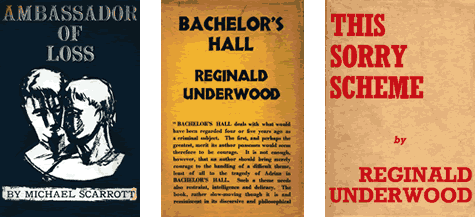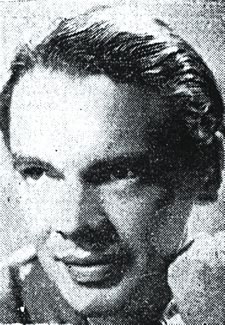

Issue 19 . Summer 2006
Bags of Bona Books . Why, it's Rank Sodomy! . Like Dawn in Paradise . Tales from the Archive
Why, it's Rank Sodomy!
Until the Gay Men's Press was established in the 1970s, the closest thing to a gay publishing house in Britain was the Fortune Press. From the Thirties through to the Sixties, a stream of queer novels was issued in the characteristically yellow-papered wrappers which became a beacon to readers searching in shabby bookshops for the elusive sympathetic read.

The proprietor of such a press at such a time was necessarily a strong character and Reginald Ashley Caton was the most eccentric of publishers. He was also the landlord of 91 slum properties in Brighton, many of which he had bought as bombdamaged bargains after the Second World War. Descending from the London train to inspect his holdings, it is said he would stop at the station toilet to change into a set of the tattiest clothes imaginable, and set off to plead poverty to his tenants, his possessions packed into an old Weetabix box under his arm.
Before his death in Rottingdean in 1971, Caton had published an impressive range of queer fiction from autobiographical schoolboy fantasies to the rustic Gothic extravaganzas of Reginald Underwood, whose bestselling Bachelor's Hall of 1934 was condemned as 'rank sodomy'.
 Biographical
details for the Fortune
Press authors are scanty but it seems that
at least two also had Sussex connections.
Humphrey Lancaster (1888-1973), a naval
man, lived and died at the Sunnyhill Hotel
at 14 Selwyn Road, Eastbourne.
His historical romances Barbarian Boy
and True Yokefellow show the interest
in slavery, bondage and discipline
which was a persistent feature of Fortune
Press productions.
Biographical
details for the Fortune
Press authors are scanty but it seems that
at least two also had Sussex connections.
Humphrey Lancaster (1888-1973), a naval
man, lived and died at the Sunnyhill Hotel
at 14 Selwyn Road, Eastbourne.
His historical romances Barbarian Boy
and True Yokefellow show the interest
in slavery, bondage and discipline
which was a persistent feature of Fortune
Press productions.
Leslie Roberts (1905-66) pictured right, after the scandalous success of his camp novels Shepherd Market and Feathers in the Bed, became a steward in the merchant navy and had a flat in later life at 56B Church Street, Brighton. Like most of the pennypinching Caton's authors, he died a poor man and left his slender savings to the white witch Doreen Valiente, in whose coven he may have been a worshipper.
Tom
Timothy d'Arch Smith's excellent bibliography R.A.Caton and the Fortune Press has recently been published in a revised edition by the Elysium Press.
Back to top of page
Back to Ourstory home page